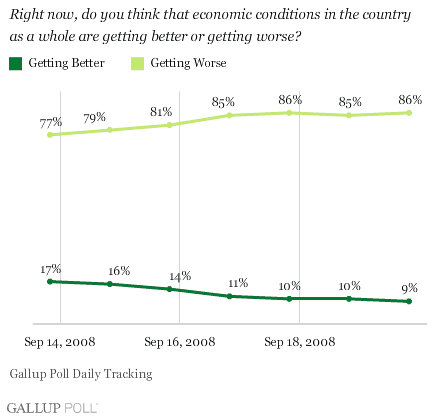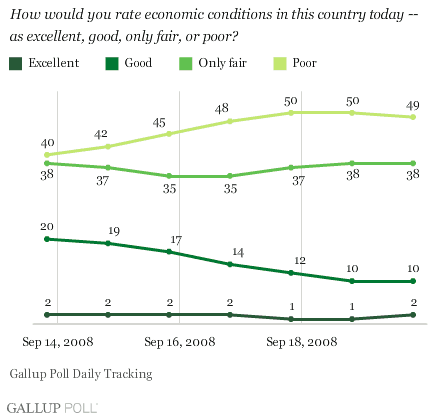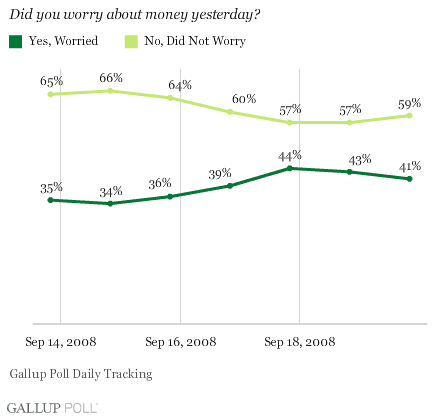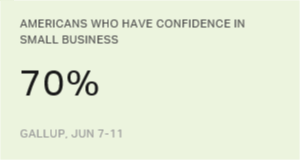PRINCETON, NJ -- Mirroring the reaction on Wall Street, Gallup Poll Daily tracking found consumer confidence began deteriorating on Monday, Sept. 15, following the announcements of the bankruptcy of Lehman Brothers, the sale of Merrill Lynch, and the government takeover of insurance giant AIG. This deterioration accelerated over the next several days, but leveled off by the end of the week and has remained stable over the weekend as the announcement of the unprecedented U.S. bailout was proposed and positively received by Congress.

Surge in Consumers Saying Economy Is "Getting Worse"
Unlike the week before, when consumers showed little reaction to the government's takeover of the mortgage finance giants Fannie Mae and Freddie Mac, consumer confidence measured in Gallup's broader economic tracking quickly began to deteriorate early last week. The percentage of Americans saying current economic conditions are getting worse increased from 77% on Sunday, Sept. 14, in Gallup's three-day rolling average of daily polls to 86% in the interviews conducted through Thursday night Sept. 18. In all likelihood, this sharp deterioration in consumer expectations was transmitted from Wall Street to main street by the plunging Dow Jones Industrial Average, the demise of two major investment banks, the chaos following the bailout of AIG, and real concerns about money market funds.
The percentage of Americans saying the economy is getting worse stabilized in Gallup's reports including interviewing conducted Friday and then held in a report including interviews from Saturday -- coincident with the announcement of the U.S. Department of the Treasury's proposed plan to bailout mortgage security holders, the government's decision to federally insure money market mutual funds, and the generally positive congressional reaction to the need for all of these emergency actions. While main street's response to this was not nearly as positive as the surge in the Dow Jones average, consumer perceptions did stop deteriorating. Like the financial markets, it appears consumer confidence remains fragile, even as the government takes historic steps to rebuild confidence in the financial system.
Similar Surge in Consumers Rating Economy "Poor"
The percentage of Americans rating the current economy as "poor" shows essentially the same response to last week's events as was the case for consumer expectations. Those rating the economy poor increased from 40% on Monday to 50% in interviews completed through Thursday night. . This measure of the consumer mood then stabilized at 50% and 49% in Gallup's reports including Friday and Saturday interviewing, respectively. While these two components of the consumers' moods -- ratings of the current economy and a prognostication about the future direction of the economy -- don't always move in tandem, the fact that they did so over the past week tends to confirm the magnitude of the forces buffeting consumers last week.

Consumers Worry About Money Surges
Probably the most troubling aspect of last week's impact on the American consumers involves its impact on their thinking as far as their personal finances are concerned. Gallup's economic tracking measure of personal worry about money ("Did you worry about money yesterday?") jumped 10 percentage points in three days, from 34% in the interviews conducted Sept. 13-15, to 44% on those conducted through Sept. 16-18. This change is somewhat remarkable because the money worry measure has, for the most part, been essentially stable -- in the 30% range -- all year. The only time it dropped below 30% was over the Fourth of July, when, presumably, Americans' minds were elsewhere. It has been as high as 40% just a few times this year, primarily in July when the gas prices spiked to an all-time high.
The point is that the panic on Wall Street and the government's response to it clearly had a pronounced impact on the way individual American families thought about their own finances early last week -- and they were thinking in negative terms.
As has been the case with the consumers' moods, these worries appear to have stabilized as last week came to an end. The percentage of Americans saying they worried about money was 43% in Saturday's report and dropped slightly to 41% in Sunday's report, which included Saturday's interviewing. And thus offered some hope of a further moderation.

Commentary
While the newly proposed government bailout proposal has stalled the deterioration in consumer confidence, that immediate success may only be temporary. How Congress deals with the Treasury proposals is likely to impact consumer perceptions. So is discussion of the proposed bailout on the campaign trail, not to mention its probable impact on the real economy. Gallup Poll Daily tracking of the consumer mood will continue to monitor the results and provide insights on the potential impact on the presidential election.
Survey Methods
Results are based on telephone interviews with 1,558 national adults, aged 18 and older, conducted Sept. 9-20, 2008. For results based on the total sample of national adults, one can say with 95% confidence that the maximum margin of sampling error is ±3 percentage points.
Interviews are conducted with respondents on land-line telephones (for respondents with a landline telephone) and cellular phones (for respondents who are cell phone only).
In addition to sampling error, question wording and practical difficulties in conducting surveys can introduce error or bias into the findings of public opinion polls.
To provide feedback or suggestions about how to improve Gallup.com, please e-mail mailto:feedback@gallup.com.
